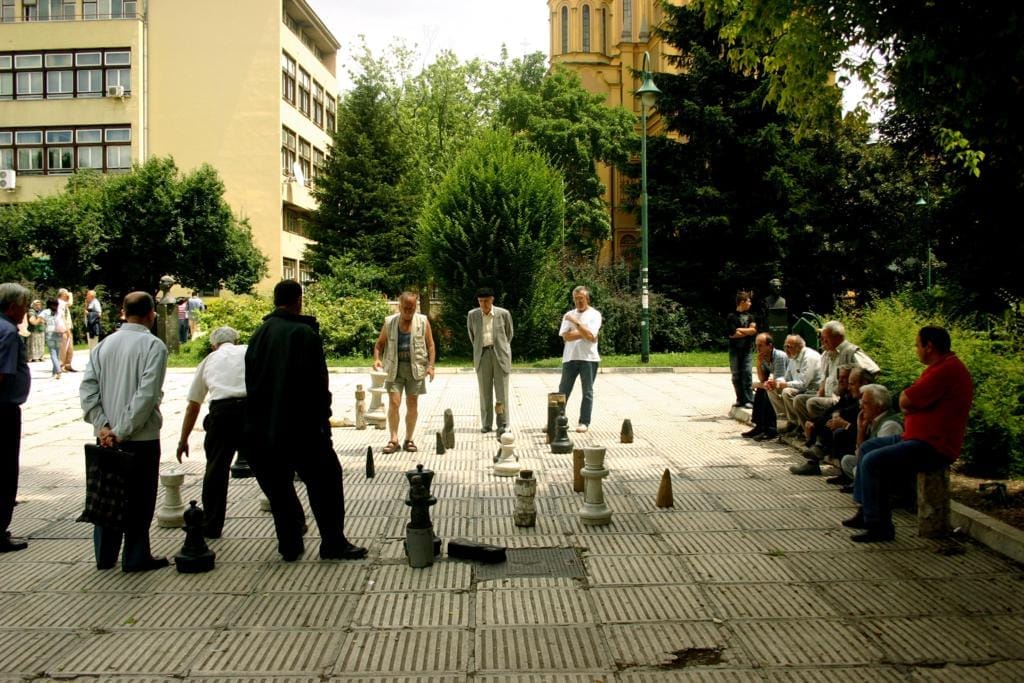Governmental units, companies and small businesses owe a vast debt to the pension funds that are supposed to insure that elderly ex-workers in Bosnia and Herzegovina (BiH) get the monthly checks they survive on.
Records obtained by the Center for Investigative Reporting in Sarajevo (CIN) show that 15,471 organizations owe nearly 632 million KM in back contributions for employee benefits as of the end of 2005, the last year the data is available from. On top of that, the government of the Federation of BiH (FBiH), the single largest debtor, is responsible for some 62 million KM worth of unpaid contributions.

A just-released study of the pension system by the Confederation of BiH Unions, entity unions and the Solidarity Center concluded ominously that ‘complete or partial lack of payment of employer contributions to worker benefits by companies is the most significant problem many workers are encountering today.’
The country, that report said, faces a looming catastrophe when tens of thousands of workers retire but have little or no pensions to support them. Those who will become too sick or too old to work will find no social safety net to catch them.
While the numbers seem staggering at first glance, further analysis shows that any effort by pension fund and tax authorities to collect from just a portion of the firms – or the FBiH government –could have an enormous effect. Just 107 companies are responsible for more than 50 percent of the unpaid business contributions.

The government of the country’s other entity has made good in recent years on promises to pay off its debt to the Pension and Disability Insurance Fund of the Republika Srpska (RS). The federation government has not.
Recently, it even deprived the FBiH fund of about 100 million additional KM in expected contributions with an unpopular decision to cut benefits to former soldiers from 35 percent of pay to 8. The government has pledged to eventually compensate for that loss.
The real problem may be that the pension fund and tax authorities are not even tracking the debt much less taking any steps – in the words of the union study – that could lead to payment of contributions such as better control over what is coming in and timely punishment for failure to pay.
It took five months for pension fund officials to collect information on what companies’ owed money and to agree to turn over the lists when CIN requested it. The Unions had to estimate and make calculations to figure out the number of workers whose full contributions are not paid.
The pension funds and the tax authorities keep no ‘reliable statistical data’ on that number, the union investigators found. They have come up with no system for collecting and analyzing numbers or for communication among entity funds and tax authorities.
But the unions figured that between 2000 and 2005 contributions went unpaid for 84,576 workers, or more than 15 percent of all workers in the formal sector.
Permission not to pay
Some of the pension fund shortfall is allowed and even encouraged.
Nadir Kovačević, Pension Fund director in FBiH, said pensioners are bearing the burden for government debt-restructuring plans designed to reinvigorate business.

Some businesses have been allowed to put off debt payments, including to the pension fund. In the RS, employers paying debts immediately can avoid paying interest that has accrued on the debt. In the FBiH, companies that pay immediately can get discounts of up to 70 percent of the principle of the debt.
Rade Rakulj, president of the RS Association of Retirees, faults firms for paying only part of the contributions they ought to. But that is a practice government officials know about and accept.

Rakulj estimated that 80 percent of the firms paying employee contributions base those payments on minimum wages and not on the actual wages employees are collecting. This means lower bills for employers now – and lower pensions for workers in the future.
In the Brčko District, where employers can chose to pay into either the RS or the FBiH pension fund, most pick the RS. This, Ilija Kalajdžić, president of Brčko District, said is because they have to pay less into that fund. Regardless, he said, employers owe big debts to both pension funds.
Debt analyzed
The biggest debtor to the FBiH fund after the government is Agrokomerc in Velika Kladuša which owes nearly 23.7 million KM and hasn’t paid into the fund since early 1992. Kreka Mines in Tuzla stopped contributing in 1998 and owes nearly 17.2 million KM. Coal Mines in Banovići stopped contributing in 1992 and owes more than 16.1 million KM.
Fund records show that 7,304 firms owe the FBiH fund nearly 372 million KM. Just 58 firms plus the Canton of Herzegovina-Neretva owe more than 1 million each. The rest of the debt is in the form of small amounts from small concerns, including taxi drivers and shop keepers.
In the RS, the top three biggest debtors are the Trebinje metal firm Industrija Alata that owes 10.3 million KM, the Banja Luka metal firm Jelšingrad that owes 9.1 million KM, and the Trebinje Novoteks firm owes nearly 6.2 million KM.

Fund records show that 8,167 firms owe the fund nearly 260 million KM but just 48 firms owe amounts of 1 million KM or more.
Pension officials are doing little to collect this money.
Kovačević said his organization negotiates with debtors about repaying debts but his office doesn’t have the jurisdiction to sue companies for nonpayment.
The RS Tax Authority has filed five criminal complaints this year against firms for white collar crimes including non-payment of pension contributions.
‘We don’t break it down separately for non-payment of pension contributions’ said spokesman Ivan Vučković. ‘Criminal complaints refer to a totality of white collar crimes, for example tax evasion, regardless of the specific charges.’ He would not identify the firms.







